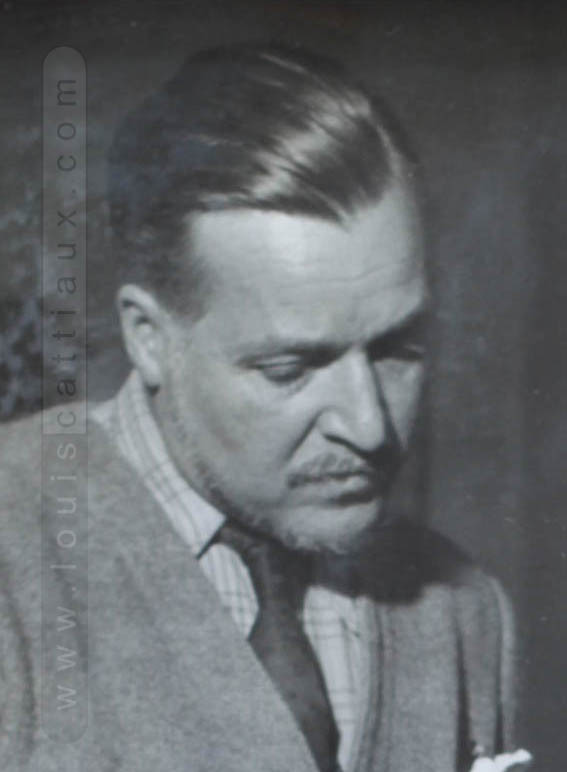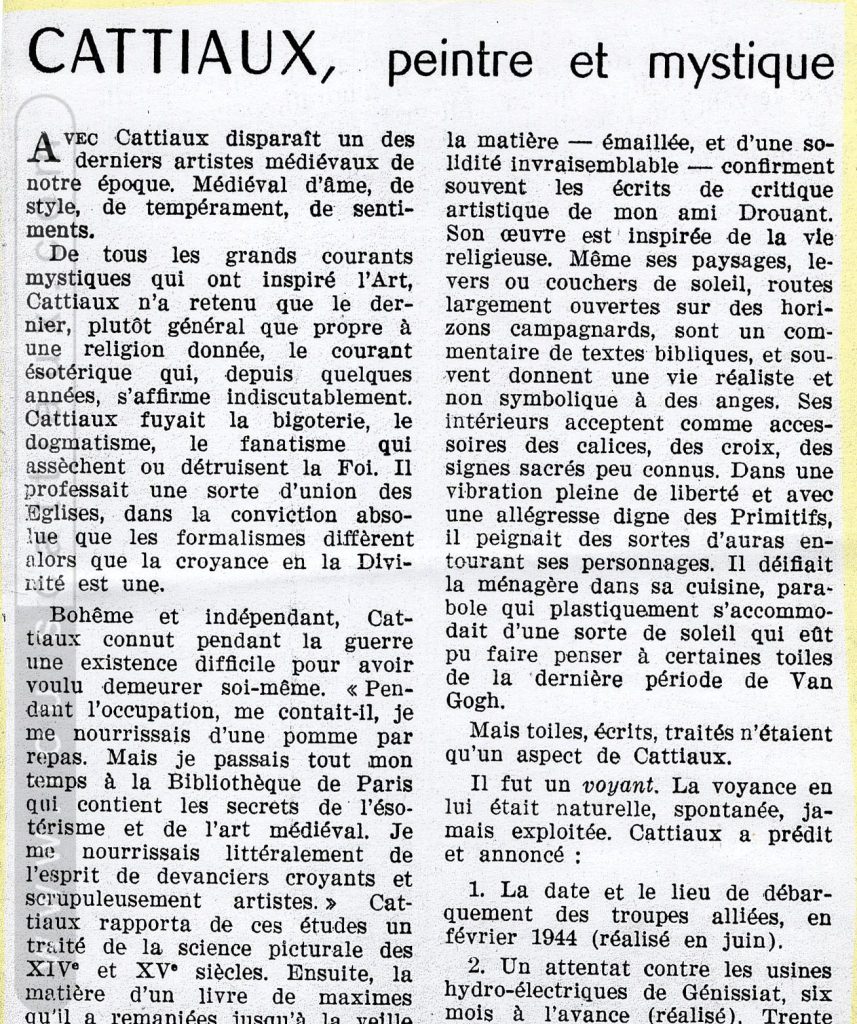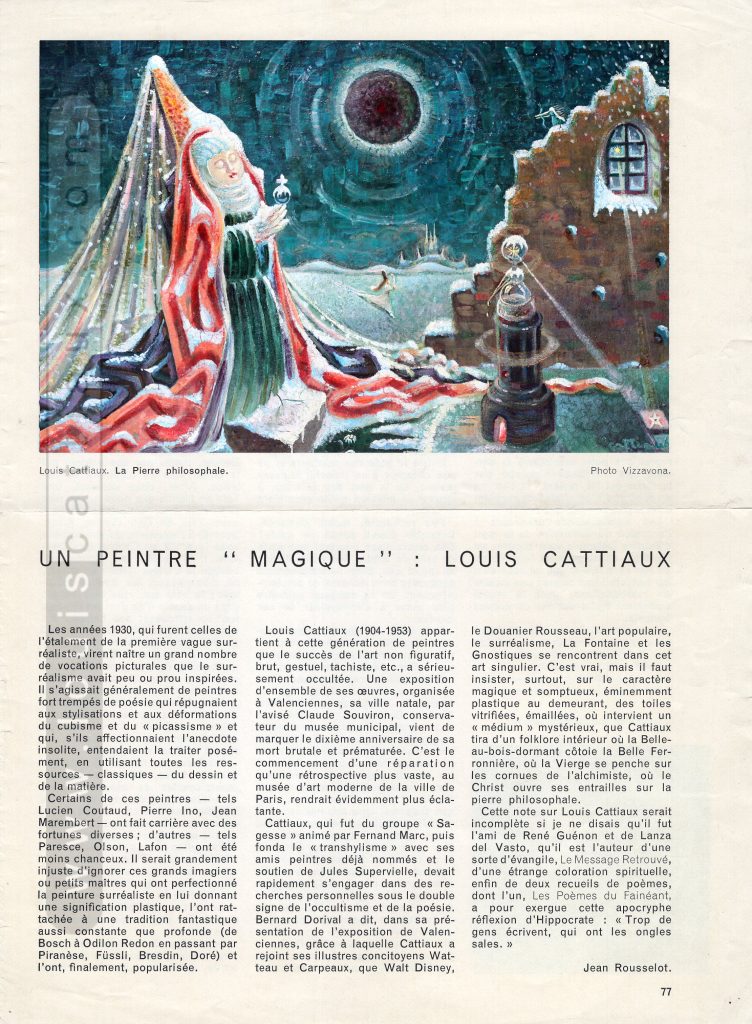There are forty thousand painters in Paris. Only one beats his rugs in the morning on the railings of Sainte-Clotilde; only one lives in the countryside in the heart of the capital, with his cat on his lap: it is Louis Cattiaux.
All you have to do is push open the slatted gate: Cattiaux is always there, in his workshop-dining room-museum, filled with multi-coloured cabochons, old weathered furniture, icons, and strange canvases.
One wonders when he works; he has never been seen doing anything other than stroking his moustache, occasionally complemented by a Florentine beard or a Second Empire moustache, petting the fur of Poupinet, a Persian prince in violet boots, or caressing the cover of some beautiful, hard-to-find book; while others struggle, sweat blood and water to «make it», Cattiaux remains wonderfully inactive, in waiting; while others go through life with claws out, sharp elbows, he spends his days gently caressing beings and things to make them love him.
Painter, poet…
Cattiaux’s painting creates itself. At least its execution does; for he meditates on it for a long time, each of his canvases slowly emerging from a demand that is both metaphysical, religious, and plastic.
While he meditates, the panels receive a layer of primer with a mysterious composition, then, a few days later, another layer, and another still. Ten minutes here, ten minutes there, the ground is finally ready, curiously vitrified, full of transparency.
Now projecting onto the canvas or wood the composition that has been built somewhere in Cattiaux’s mind will be as easy and pleasant for him as a game; it happens very quickly, the hand guided by a muse whose name is not found in the dictionary.
The wonder is that this mediumistic execution is of exemplary artisanal solidity; Cattiaux knows all the resources of his craft; he understands that every stroke matters; he is familiar with all the old secrets that allow the inspired artist to dominate, to harness the dangerous prestige of matter. But where many stumble in long patience, he advances in lyrical leaps, through immediate discoveries.
It does not take him more time to write poems: The Poems of the Idler, at the top of which he has placed this epigraph mischievously attributed to Hippocrates: «Too many people write who have dirty nails». These are small haikus in prose, sententious, all filled with obviousness, that a man with clean nails traces on the reverse of our lives soiled by greed, hatred, and the unnecessary hustle.
A poet in his painting – through the wonderful invention that allows him to give form to his postulates, flesh to his pure speculations – Cattiaux is a painter in his poetry, in the sense that each of his poems is like an illustration of what he expresses in painting: alchemical virgins, tigers crowned with suns and encircled by the eternal serpent, dazzling bursts of a cosmos that is immediately gathered by the systole of the heart.
…and a philosopher
Cattiaux’s philosophy and his metaphysics do not hide their sources: Tradition, Esotericism; the example of René Guénon further strengthens him in his revolutionary faith.
For to be revolutionary is to oppose with all one’s soul the utilitarianism and bureaucratism of moral, religious, and social institutions.
For Cattiaux, rebellion begins with immobility, the refusal to take «the chance»; his notion of perfection is contrary to that which professors and philosophers teach; the priests themselves do not have his favour, too generally confined to their task of distributing graces and pardons. His god is the Unique, his religion is Love.
The Message Rediscovered expresses all this in short chapters that fit together according to an internal logic that is not immediately perceived, and whose titles are provided by anagrammatic variations on the words: Vérité nue, i.e. Naked Truth. Here are some of those variations: Vertu niée – Une vérité – Ève tri une – Un être vie – Trêve unie – Unité rêve – Vu et renié – Trié en vue – Vue tri née – Ivre et nue – Rive ténue – Nuit rêvée.
Lanza del Vasto prefaced The Message Rediscovered, which Cattiaux sells or gives away depending on the merits of the recipient.
Apothecary, chiromancer, and healer
«One must become a seer», said Rimbaud. Cattiaux followed this advice. At will, he «absents» himself within, overturning the barriers that separate us from yesterday and tomorrow; he reads in you as in himself: openly, and, of course, no palm holds secrets for him. The poets of Saint-Germain-des-Prés will soon make no decision without consulting him; he has already diverted quite a few from tobacco, alcohol, and their wicked Muses; he will prevent them tomorrow from writing bad poems; today, he is content with a glance from his blue eyes, a small reflection from his gentle voice, to keep them from taking themselves too seriously. Wherever he is, the unusual settles in with him; he always seems to come from very far away, from a pacified world where one could live without eating, without working, without fighting. This character is, by the way, nothing of a sorcerer: his complexion is fresh, his build optimistic, his laughter resounding. What is «phenomenal» about him is that he is happy, candidly happy in a world that despairs.
A sage
Cattiaux, between his wife Henriette and his cat Poupinet, between his palette and his writing desk, leads the life of a sage. He has the joy of a child, the tender humour of a saint. He has good sofas to sleep on, flowers to brighten his view, and sturdy hundred-year-old chestnut trees across the street to provide him with shade and coolness. The «fakir» Cattiaux, squatting, bare-chested, with his head wrapped, was merely a photograph to be displayed in occult bookstores; he laughs at it first and I doubt he takes the magic sessions he sometimes attends very seriously. The real Cattiaux is to be found on Casimir Périer Street, cherished, cherishing, and obtaining graces solely through the exercise of his love. «Before whom one prostrates, one will prostrate», said the great Lithuanian poet Milosz. «To whom gives, one will give», could be Cattiaux’s motto, as known and unknown friends shower him with their blessings in exchange for his contagious joy (the best medicine) and his brush games (the best painting).



